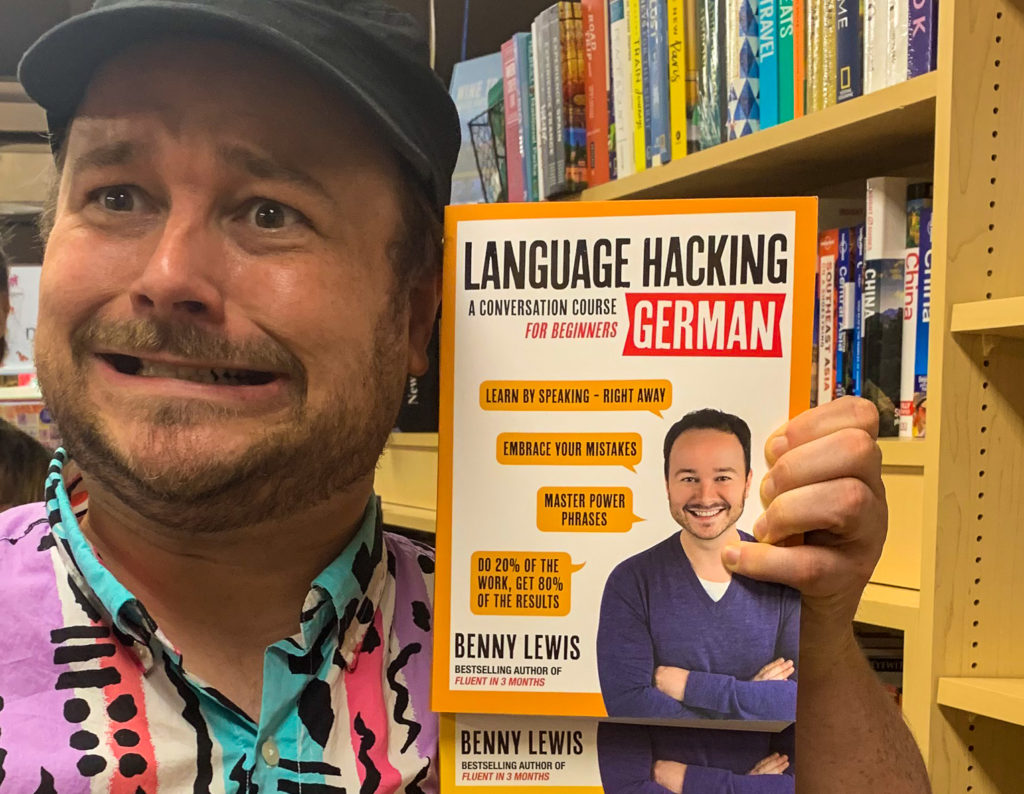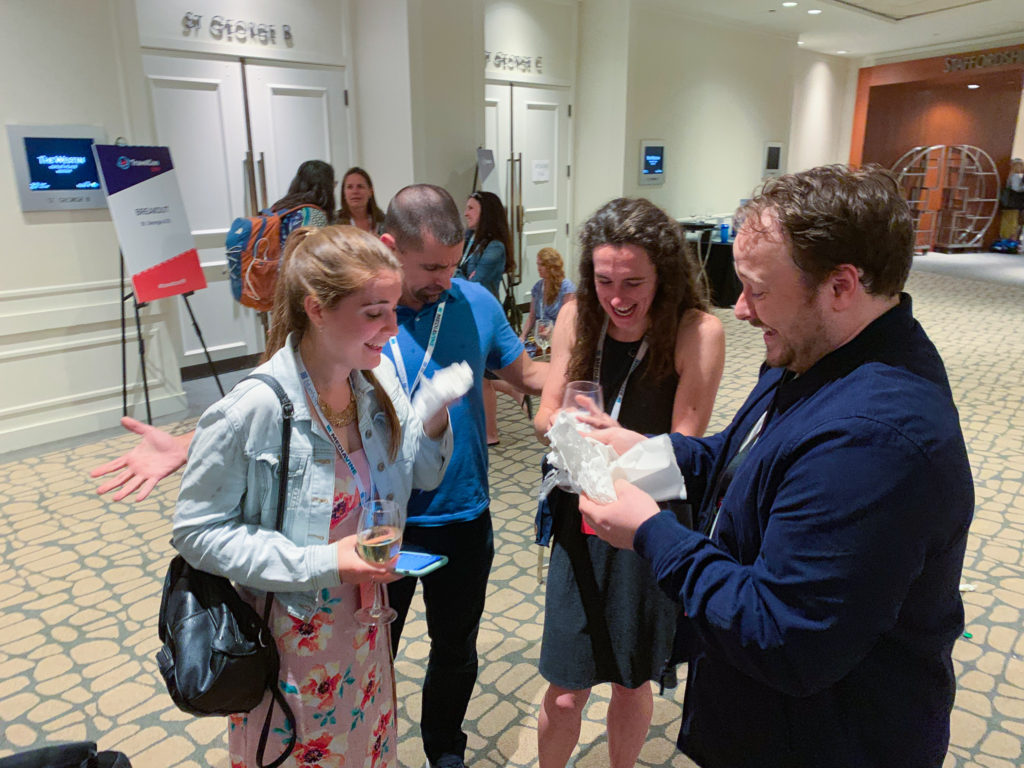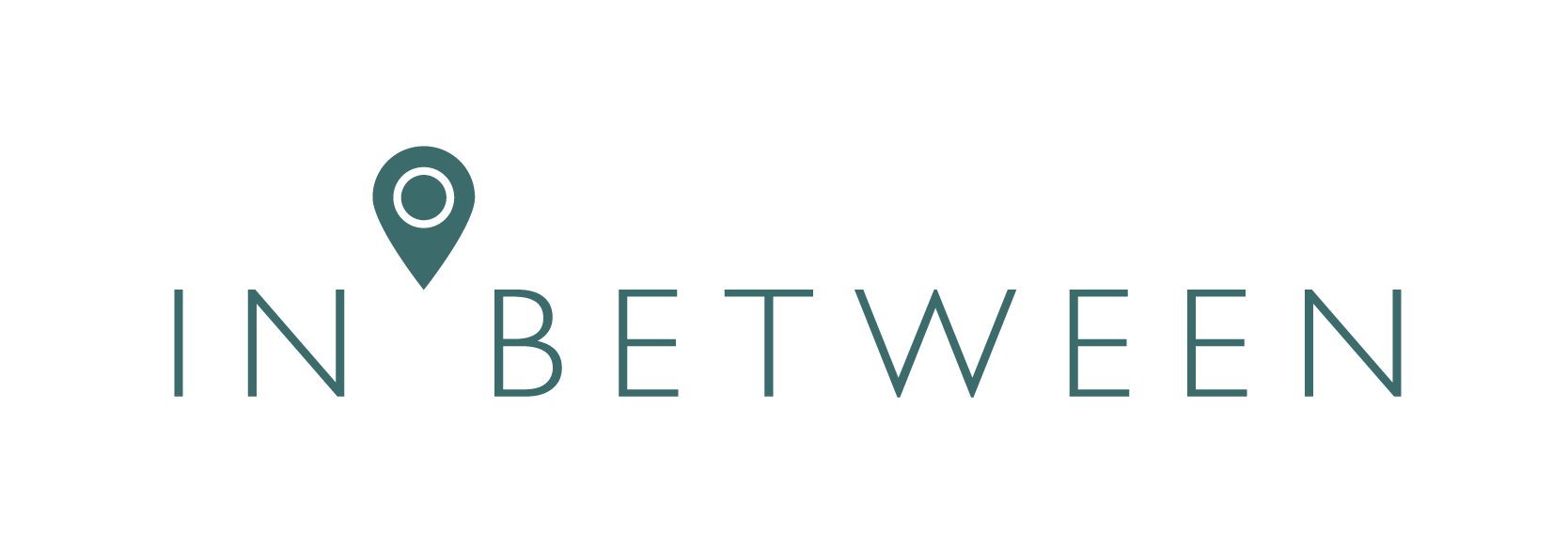
Just a month ago I was at TravelCon in Boston for my first travel conference. It was my first conference, of that size at least, ever. On the first evening we milled about happy hour meeting fellow attendees and speakers alike. I found myself in a cluster of people that were chatting with Benny Lewis about the struggling to learn a new language. Benny is the international bestselling author of Fluent in Three Months, a polyglot fluent in six languages (but able to carry on a conversation in twelve), a language coach, a YouTube star, and has been named Traveler of the Year by National Geographic. He also spilled my wine, so I felt brave enough to ask for an interview.

I sat in a session the day before conducting this interview on “how to conduct a killer interview” and felt supremely unprepared to talk to Benny Lewis. But he’s a busy guy, and I wasn’t going to pass up the opportunity to borrow a few moments of his time on the Sunday morning following the conference to snag an interview for the in-between community.
Lindsey: So, from everything I learned yesterday, I should be a lot more prepared than I am right now. But we’re just going to try to have a casual conversation and I’ll work with it. I know I shouldn’t ask “how did you get where you are today?”
Benny: Good, I hate that question. I like to answer, “I walked here” or “I took a flight”. I wear a completely serious face and then they realize it’s going to be a hard interview.
Lindsey: I’ll just start with what I know about you. Feel free to correct me or add on. You are an author, with an international bestseller. You teach a series of classes to help people learn new languages called Language Hacking. You’ve been named National Geographic’s Traveler of the Year.
Benny: You did prepare, that’s very good. *Laughs*
Lindsey: I didn’t have time to read your book, but I did do a little bit of research. And I found out this morning on our walk here you are a runner, too.
Benny: Well, I aspire to be a runner and people laugh at me, or I imagine they laugh at me, while I attempt to run.
Lindsey: If you take steps running you are a runner. So. But that’s a lot.
Benny: Yeah, and I was presenting at [TravelCon] here on tech.
Lindsey: So, can I be honest, a lot of people look at someone who has done a lot of things, like you have, and think “Wow, they have it together. That’s awesome; they’ve got some things figured out.” Do you feel that way? Or do you ever feel like you don’t know what you’re doing?
Benny: I… don’t have a clue what I’m doing. I have nothing together. The way I’ve been able to learn new language(s) was by being the guy who embraced making mistakes. So, I feel like an idiot most of the time because I’m hyperaware of those mistakes. In growing a blog and a business I’ve had to learn a lot of the technical parts of that, and it’s a case of just becoming good enough to do something. You have to have a wide variety of skills if you want to run a business.
I have met people who, when it comes to language for instance, they are actual geniuses. They can speak fifty plus languages with no accents. I see them as the naturals. But I did really poor in school with learning new languages, lived in Spain for six months and didn’t pick up any Spanish… but after that, to learn a new language, I just embraced sounding like Tarzan. Everything I can do I do just well enough that it doesn’t sound too bad, and I spread that wide. I also have ADHD and people with ADHD are not very good at focusing on one things.
Lindsey: I really appreciate that you say it’s all about embracing making mistakes. The other night when we were talking I realized that’s one reason I struggle, because it’s so hard to get past the way I sound. So what’s your advice for someone who wants to try to do something like that? I mean I know you’ve written a whole book on this and you teach classes, but what’s the condensed version of how to encourage someone to try?
Benny: Well, first I would say your goal should actually be to make mistakes. So when I start off I have an imaginary target: today I need to make two-hundred mistakes. So instead of being hyperaware of “oh I mis-conjugated that verb” or “oh no, I didn’t use the right word,” I’m like, this is literally what being a beginner is like. I think too many people have their eye on the super-distant end goal. They don’t want to just learn a new language, they want to master it. They want to sound articulate and give a philosophical debate in the language or something.
I just embrace that, if I can just say, “Supermarket where?” that that is getting the point across much better than, “Excuse me kind sir, could you direct me to the nearest supermarket, if you please?” If you can simplify everything… People just need to know that the goal is communication. If I say, “Yesterday I eat pizza” that’s not using the past conjugation but everybody will understand that. As a beginner your goal is not to sound eloquent; the goal is to be understood and to try to understand. So when people speak back to you, you’re not going to understand everything they say. But maybe you can catch what you need and extrapolate their meaning. It’s a case of letting go of perfection.
Lindsey: So we just attended a conference centered around travel, what has drawn you to other places?
Benny: It’s actually quite typical in Europe that we take a gap year so after I graduated I did that. I spent time in Spain and a few other European countries. When I finally embraced the language-learning side of it, it just made it so interesting because all of my friends were locals. It really pushed me outside of the bubble I grew up in and the culture I was used to. It’s interesting that even after doing it for seventeen years, I haven’t lost the interest in discovering new cultures, mostly because doing it in their language is always going to make it interesting.
Lindsey: Do you have a wildest, or funniest tale involving a miscommunication with somebody?
Benny: Sure, sure. For instance, when I was learning German I had a female friend, and I wasn’t chatting her up or anything and she knew that. I knew her boyfriend and everything. And I’d just recorded a YouTube video. What I really wanted to say was, “I look really cool in this video, do you want to come up and see it?” What I actually managed to say was, “I’m horny, and I want you to come inside me.”
Lindsey: *Laughing* Oh my word!
Benny: So, effectively the word for “cool” in German, you can use it for situations, but if you say, as a person “I’m cool” or “I look cool” it’s effectively – it’s the word “horny.” And I wasn’t aware of that. I was extraordinarily aware from that day forward.
Lindsey: The blog is all about embracing feeling lost in life. I find that travel and adventure helps us to deal with that struggle. What is your advice for someone who feels totally lost? How do you suggest coping with that feeling?
Benny: I’ve gone through my own various struggles and hard periods in life, and what I’ve found is, generally, I keep myself in those lulls when I’m keeping myself in my comfort zone. You get into such routines and part of it is “I suck, I’m not good” and all of these things that you just neurologically get in a pattern of repeating yourself, repeating your feelings and repeating what you do. So by traveling, you are completely annihilating your routines and it’s opening you up to seeing that maybe you should be a lot happier.
A huge thank you to Benny Lewis for this interview; be sure and check out his books and his YouTube channel! Want to learn a new language? Check out his books!

Ah this interview turned out so great! I know exactly what he’s talking about with “cool” being the same as “horny” in German 😂 Great job asking some good interview questions!
Thank you! I was pretty pleased with it; Benny had some great answers!